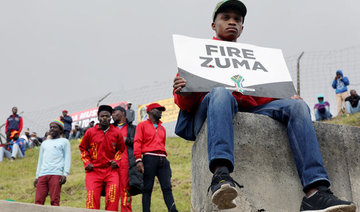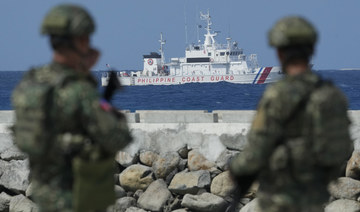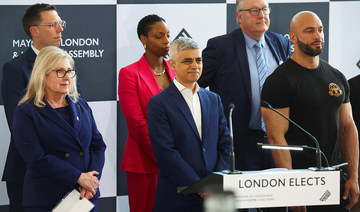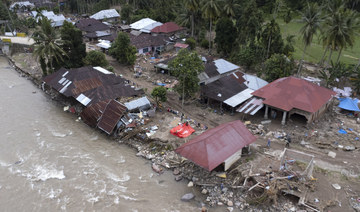JODHPUR, INDIA: In the summer of 1944, hundreds of royals gathered for the opening of Umaid Bhawan Palace, a magnificent sandstone edifice that dominates the skyline in India’s northwestern city of Jodhpur. It was the last of its kind.
Three years later, India was free from British colonial rule, and more than 500 princely states — the semi-sovereign principalities ruled by royal clans — faced an uncertain future. Most have faded into obscurity, but the family that built this palace continues to thrive — in part by converting a section of it into a hotel.
“How many places do you know in the world where you can actually live right where the maharaja is living next door to you?” said the hotel’s general manager, Mehrnawaz Avari. “The idea is to treat our guests like kings and queens.”
The 347-room palace, considered one of the world’s fanciest residences, was used as the primary location for “Viceroy House,” a film by director Gurinder Chadha being released Friday in India. The movie details the last days of the British Empire in India and the bloody partition with what became Pakistan in 1947.
The iconic structure in this west Rajasthani city known for its traditional handicrafts was named after Maharaja Umaid Singh, the last king of what was known as the Marwar-Rathore Dynasty. He commissioned the project in 1929 with a “spirit of grandness,” said royal family associate Karni Singh Jasol. “He had a larger-than-life vision.”
After independence, most of India’s princely states opted to join the democratic republic, and initially maintained their titles, property and a degree of autonomy. Within decades, the royals lost almost all of it, though. India amended its constitution in 1971, giving its citizens equal rights and canceling royal privileges, including the regular payments royal families received from the state.
Stripped of their allowances and unsure how to survive as commoners, many royal families descended into chaos. Some held onto property, only to lose it amid internal bickering over rival claims.
“The properties that they inherited were in a true sense white elephants,” Jasol said. “The royal families were high on assets, but low on liquidity. They didn’t have large bank balances to turn their family properties into something grand or sustain it for the future.”
The Singhs of Jodhpur not only maintained their holdings, but managed over decades to grow.
The last reigning maharaja’s grandson, Gaj Singh, was only 4 when his father died in a plane crash in 1952, making him sole owner of the palace and other family properties, including the ancestral Mehrangarh Fort.
When royal allowances were canceled in 1971, the young Singh patriarch acted quickly. The family opened part of its palace as a hotel in 1978, and turned the fort into a museum, investing profits into preserving Jodhpur’s royal antiquities.
“They today serve as the main economic levers for the city,” said Jasol, who is director of the fort and museum.
The palace is open to visitors year-round, and has become a go-to destination for government leaders, other royals, and Hollywood and Bollywood stars alike. In 2007, British actress Elizabeth Hurley married Indian businessman Arun Nayar beneath the white marble canopy, or baradari, on the palace lawn; they have since divorced.
The palace is divided into a home for Gaj Singh and his family, and a heritage hotel of 64 rooms and suites run by the luxury hotel chain Taj Group since 2005. Designed by British architect Henry Vaughan Lanchester, the palace features elements of the art deco style popular in Europe and America in the ‘30s and ‘40s, combined with traditional Indian craftsmanship.
Colonnaded verandas guide one’s eye up to intricately carved pillars, stylized sculptures and finally a massive central dome topped by a 30-meter (105-foot) golden cupola.
The cost of the royal experience ranges from $500 to more than $12,000 a night. For those who can afford it, the hotel pulls out all the stops.
Visitors are greeted by a smiling guard wearing one of Jodhpur’s famous handlebar moustaches; he opens the door while hotel staff shower guests with rose petals. Peacocks roam the palace lawns. Further inside, pulsating Rajasthani folk tunes fill the air as colorful dancers move in choreographed circles. Guests mingle amid crystal chandeliers and silk-draped furniture.
Gold-leaf furniture and ornate mirrors are arranged around gleaming marble floors, while the walls are decorated with family portraits, as well as leopard skins and the busts of other animals hunted by former royals. The decoration was done over three years by Polish artist Stefan Norblin, who had fled from war-torn Europe in 1944. He also painted frescoes and murals in the royal suites.
The royal family has long focused on conserving the region’s heritage as a way to utilize its enormous real estate holdings. It manages trusts engaged in water conservation, education and cultural revival projects, creating employment for thousands of locals.
“I know at one time, royalty was a bad word,” said Singh’s daughter, 42-year-old Shivranjani Rajye. “Now you don’t have to shy away from it.”
The Cambridge-educated Rajye runs most of the family’s business operations, though the family heir is her brother, Shivraj Singh, who also lives with his family in the palace. He has kept a low profile since spending several months in a coma after a near-fatal accident playing polo in 2005.
Jodhpur’s residents still see the family as their royals, and Gaj Singh as their maharaja. And he “very much believes he is the king,” said Rajye, elegantly dressed in a chiffon sari with a hint of jewelry.
“He never gave up his title — he doesn’t have it officially, but he knew who he was, and he knew he commanded respect of the people.”
7 decades into Indian democracy, a royal palace thrives
7 decades into Indian democracy, a royal palace thrives
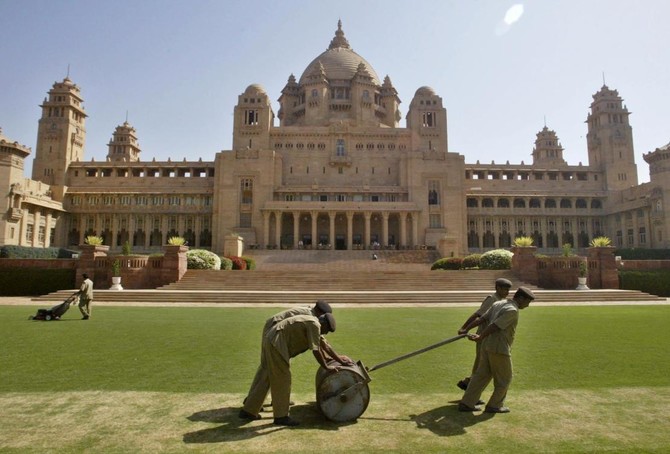
Charities brand UK family reunion system for asylum-seekers ‘broken’

- New report says thousands waiting for relatives to be relocated to Britain
- Refugee Council CEO: ‘The UK has clearly failed the Afghan refugees that it promised to protect’
London: Charities in the UK have branded the country’s system for reuniting separated families of asylum-seekers “broken,” calling for the Home Office to “fix and expand” it.
A new report published by the Refugee Council and Safe Passage International has highlighted figures showing a backlog of more than 11,000 migrants in the UK waiting to be reunited with relatives during the summer last year.
Despite repeated freedom of information requests, the Home Office has not provided updated figures since then.
The report mentioned that a particular problem faces separated Afghan families, with many individuals reaching the UK but finding themselves in prolonged legal difficulty and their relatives forced to remain in Afghanistan, neighboring Pakistan or elsewhere.
Currently, Afghans evacuated from their country as part of Operation Pitting in August 2021 are prevented from automatically bringing close family to the UK.
In October 2023, the British government proposed a new system to address this issue, but the plan has yet to implemented despite pressure from MPs and members of the House of Lords.
Approved asylum-seekers can apply for a family reunification visa, but thousands find themselves stuck in a backlog of cases despite the Home Office saying the process should take under 12 weeks.
The Independent spoke to a number of Afghans, including a former pilot, struggling to be reunited with their relatives.
The pilot told the newspaper: “They (his family) have been waiting for a visa for five months in Iran, but so far there is no news from the embassy and there is no guarantee it will be issued.
“My family are facing a lot of problems. They don’t have a proper place to live, and don’t have access to a doctor, because they are living illegally.
“Their Iranian visas have expired and they need to extend them, but it is impossible. My wife is suffering mentally and emotionally, and she is completely (without hope).”
Another issue is that of unaccompanied children who, under current rules, also cannot use their status to automatically relocate their families to the UK.
The Independent spoke to one Afghan teenager, Farhad, rescued from Kabul without his parents in 2021, who faces an anxious wait to see if his family can join him in the UK.
“(The UK government) promised in 2021 that they’re going to bring the families, but it’s still been almost three years,” he said.
“My mum and my siblings are in Pakistan because they needed a doctor and medication. But my father couldn’t get the visa to go with them.
“I am doing my GCSEs this month and I can’t really focus on my studies knowing that my family is struggling.”
Safe Passage International highlighted the case of another young boy, Ahmad, who had tried to join his older brother in the UK.
Despite both his parents having died in Afghanistan, the Home Office denied that he had any “serious and compelling” circumstances to justify his asylum application.
He was only able to stay in the UK after a judge intervened, ordering the Home Office to provide assistance.
Safe Passage International’s CEO Dr. Wanda Wyporska told The Independent: “Nearly three years on, it’s a national shame that Afghans, who risked so much to support UK military operations, are still waiting for a way to bring their family to safety here with them. Their family members are living in fear every day of the Taliban.”
The Refugee Council’s CEO Enver Solomon said: “The UK has clearly failed the Afghan refugees that it promised to protect, by keeping families separated for so long with no information on how they may be reunited.
“After risking everything for the UK, Afghans and their families should not be forced to make dangerous boat journeys to get here, nor should they face hostile, inhumane policies like the Rwanda plan when they do make it to the UK.”
A Home Office spokesperson told The Independent: “We made one of the largest commitments of any country to support people from Afghanistan, and so far we have brought around 27,900 individuals to safety in the UK, including thousands under our Afghan resettlement schemes.
“In October we committed to establish a route for those evacuated from Afghanistan under Pathway 1 of the Afghan Citizens Resettlement Scheme without their immediate family members, to reunite them in the UK.
“We remain on track to meet that commitment and open the route for referrals in the first half of this year.”
Philippines to tighten guard at locations in South China Sea

- Philippine Coast Guard deploys ship to Sabina Shoal on the Spratly archipelago, where it accused China of building an artificial island
MANILA/BEIJING: The Philippines said on Monday it would keep a closer guard on reefs, shoals and islets in its exclusive economic zone in the South China Sea, alarmed by reports of new reclamation activities by China, which Beijing denied.
The Philippine Coast Guard said on Saturday it had deployed a ship to Sabina Shoal on the Spratly archipelago, where it accused China of building an artificial island, having documented what it said were piles of dead and crushed coral on the sandbars.
Jonathan Malaya, spokesperson of the National Security Council (NSC), said NSC chief Eduardo Ano had ordered a tighter guard at locations within Manila’s 200-nautical mile economic zone, as a long-standing diplomatic row with Beijing intensifies.
“No one will guard (these locations) except us. It is our responsibility under international law to guard (them) and ensure that the environment there would not be damaged and that there won’t be reclamation activities,” Malaya told a regular television program.
China claims almost all the South China Sea, including parts claimed by the Philippines, Brunei, Malaysia, Taiwan and Vietnam, and has carried out extensive land reclamation on some islands, building military facilities, causing concern in Washington and the region.
China’s foreign ministry on Monday dismissed Manila’s latest accusation as “groundless and pure rumor.”
“Recently, the Philippine side has repeatedly spread rumors, deliberately smeared China and attempted to mislead the international community, which is futile,” spokesperson Wang Wenbin told a regular briefing.
He urged Manila to “return to the right track of properly settling maritime disputes through negotiation and consultation.”
Philippine Coast Guard spokesperson Jay Tarriela said its presence at the Escoda shoal had deterred China from doing small-scale reclamation, but that scientists would have to determine whether the piles of coral were natural or man-made.
He said the coast guard was committed to maintaining a presence at the shoal, just over 120 nautical miles from the Philippine province of Palawan.
The Permanent Court of Arbitration ruled in 2016 that Beijing’s claims in the South China Sea, a vital waterway, had no basis under international law, a decision that China rejects.
The Sabina Shoal, known locally as Escoda, is the rendezvous point for vessels resupplying Filipino troops stationed on a grounded warship at the Second Thomas Shoal, where Manila and China have had frequent run-ins.
Ano has called for Chinese diplomats to be expelled over the alleged leak of a phone conversation with a Filipino admiral about the maritime dispute.
On Monday, the Philippine foreign ministry said it would look into reports of “illegal and unlawful activities” by diplomatic officials, but did not name China.
3 men charged in the UK with assisting the Hong Kong intelligence service

- The men will appear at Westminster Magistrates’ Court charged under the National Security Act
LONDON: Three men have been charged with allegedly assisting Hong Kong intelligence services and with foreign interference, London’s Metropolitan Police said Monday.
The men will appear at Westminster Magistrates’ Court charged under the National Security Act.
Chi Leung (Peter) Wai, 38, Matthew Trickett, 37, and Chung Biu Yuen, 63, have each been charged with assisting a foreign intelligence service.
“While these offenses are concerning, I want to reassure the public that we do not believe there to be any wider threat to them,” said Commander Dominic Murphy, Head of the Met’s Counter Terrorism Command.
“This investigation remains ongoing, but now that charges have been brought, I urge people not to speculate or comment further in relation to this case.”
Hong Kong’s security bureau, Hong Kong police and the office of China’s foreign ministry in Hong Kong did immediately respond to requests for comment.
Floods kill 43 in Indonesia’s West Sumatra, 15 missing
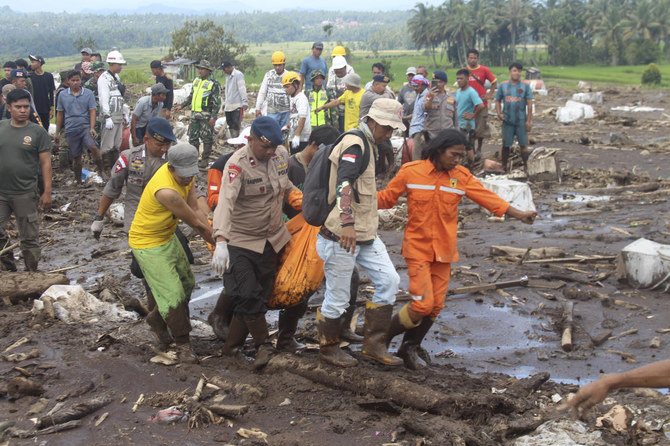
- Torrential rain on Saturday evening triggered flash floods, landslides, and cold lava flow in three districts in West Sumatra province
- Around 400 personnel, including rescuers, police, and military, were deployed to search for the missing people on Monday
TANAH DATAR: Flash floods and mud slides in Indonesia’s West Sumatra province killed at least 43 people over the weekend while a search for 15 missing people continued, authorities said on Monday.
Torrential rain on Saturday evening triggered flash floods, landslides, and cold lava flow — a mud-like mixture of volcanic ash, rock debris and water — in three districts in West Sumatra province, Abdul Malik, chief of the provincial rescue team, said.
The cold lava flow, known in Indonesia as a lahar, came from Mount Marapi, one of Sumatra’s most active volcanoes.
In December, more than 20 people were killed after Marapi erupted. A series of eruptions has followed since.
“The heavy rain swept materials such as ash and large rocks from the Marapi volcano,” said Abdul Malik, who later added in a statement that 43 people had died and 15 remained missing.
“Cold lava flow and flash floods have always been threats to us recently. But the problem is, it always happens late at night until dawn,” he said.
Abdul said around 400 personnel, including rescuers, police, and military, were deployed to search for the missing people on Monday, helped by at least eight excavators and drones.
The national disaster and management agency BNPB said in a statement almost 200 houses were damaged and 72 hectares (178 acres) of lands, including rice fields, were affected. At least 159 people from Agam district were evacuated to nearby schools.
Footage shared by BNPB showed roads and rice fields covered by mud. Video also showed the wreckage of damaged homes and buildings, while the floods brought logs and large rocks into settlements.
Eko Widodo, a 43-year-old survivor, said: “The flooding was sudden and the river became blocked which resulted in the flow of water everywhere and it was out of control.”
German court backs intelligence agency’s designation of far-right party as suspected extremist case

- The party could still seek to appeal the verdict at a federal court
BERLIN: Germany’s domestic intelligence agency was justified in designating the far-right Alternative for Germany as a suspected case of extremism, a court ruled Monday, rejecting an appeal from the opposition party.
The administrative court in Muenster ruled in favor of the BfV intelligence agency, upholding a 2022 decision by a lower court in Cologne, German news agency dpa reported. Alternative for Germany, or AfD, has rejected the designation strongly.
The party could still seek to appeal the verdict at a federal court.
AfD was formed in 2013 and has moved steadily to the right over the years. Its platform initially centered on opposition to bailouts for struggling eurozone members, but its vehement opposition to then-Chancellor Angela Merkel’s decision to allow in large numbers of refugees and other migrants in 2015 established the party as a significant political force.
AfD has been polling strongly in Germany in recent months as discontent is high with center-left Chancellor Olaf Scholz’s three-party coalition government.
However, its support declined somewhat following a media report in January that extremists met to discuss the deportation of millions of immigrants, including some with German citizenship, and that some figures from the party attended. The report triggered mass protests in the country against the rise of the far-right.





